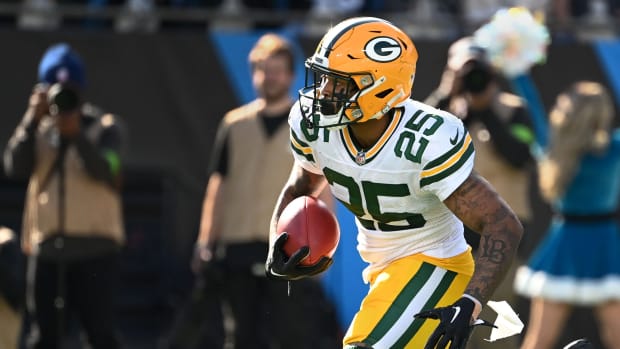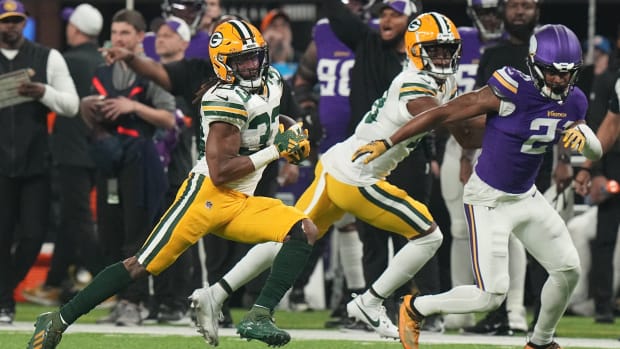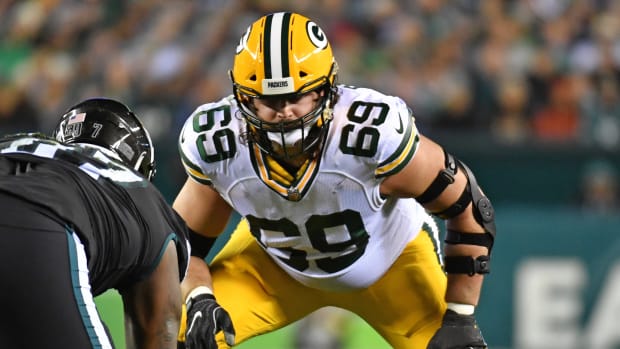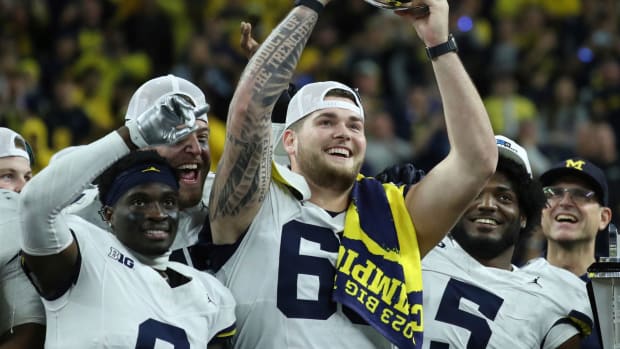LaFleur Faces Dilemmas on Special Teams
GREEN BAY, Wis. – There are two ways for the Green Bay Packers to fix the annual train wreck that is their special teams.
The first is to use better players on those teams.
The second is to change coordinators.
The first is more likely to yield better results and appears to be coach Matt LaFleur’s focus.
First-year coordinator Maurice Drayton’s debut season could hardly have gone worse. The Packers finished last in the annual rankings assembled by SI.com’s Rick Gosselin. His group saved its worst for last in Saturday night’s 13-10 playoff loss to the 49ers.
Green Bay had a field goal blocked at the end of the first half, which took three points off the board, gave up a kickoff return to midfield to start the second half, which set up a field goal, and had a punt blocked near the end of the game, which gave San Francisco seven points. That’s a 13-point swing in a three-point outcome. The Aaron Rodgers-led offense didn’t play well but the Packers would have won, anyway.
LaFleur spent Monday conducting exit interviews with the players so has not sat down with Drayton to contemplate his future.
“We’ve got to look at everything,” LaFleur said during his season-ending Zoom call. “We’ve got to look at everything and, if we feel like we can improve in certain areas, then we’ll make tough decisions. But we’re not remotely close to getting into that at this point in time.”
Special teams have been a disaster for years. In Gosselin’s rankings, the Packers have finished 20th or worse in seven of the past nine seasons. That includes bottom-of-the barrel marks in 2021, 2018 and 2014. They have not fielded a top-10 unit since 2007.
Part of that is personnel. The Packers have focused on a core of eight or 10 high-priced, game-changing veterans for years. That group eats most of the salary cap, meaning a bottom of the roster populated by minimum-salary, inexperienced players. A potential solution, LaFleur said, would be “having a couple guys that potentially that’s their value is what they bring” to special teams.
In addition, LaFleur will contemplate using more starters on special teams. That wouldn’t mean having Davante Adams as a gunner on the punt team or cornerback Eric Stokes playing in every phase in addition to his 60-plus snaps on defense. Rather, it would be the sprinkling in of starters here and there, like LaFleur did down the stretch with cornerbacks Stokes and Rasul Douglas.
LaFleur pointed to how the 49ers deployed their personnel on Saturday night. In the Gosselin rankings, the 49ers finished 25th this season so they weren’t appreciably better than Green Bay. But in the biggest game of the season, the 49ers won the matchup in a landslide.
“San Francisco had a lot of their starters on special teams,” LaFleur said. “That’s going to be something that I want to do some studies around the league and see how many teams operate that way.”
Interestingly, LaFleur’s reasoning doesn’t hold much water. On Saturday, 21 Packers played at least half the snaps on offense and defense. Those players logged 38 snaps on special teams. The 49ers had 23 players with 50 percent playing time. Those players logged 41 snaps on special teams. In both cases, a big chunk of those snaps were played by linemen on field goal/field goal block. On coverage and returns, it was 18 snaps for San Francisco’s core players vs. 20 for Green Bay’s.
Among offensive players only, the special-teams breakdown was 19 for San Francisco (nine by linemen) vs. six for Green Bay (six by linemen). One of those snaps was star receiver Deebo Samuel returning a kickoff to the 50.
However you slice it, there’s an obvious risk to using starters on special teams. And that risk was driven home during a kickoff return on Saturday night when one of Green Bay’s core special-teamers, linebacker Oren Burks, fell knee-first onto the chest of running back AJ Dillon, breaking one of Dillon’s ribs. Who knows, maybe the Packers would have won had Dillon been available on the drive that had a first-and-goal at the 7 but managed only a field goal.
“I think we can do a much better job, starting with myself, emphasizing the special teams, allowing some of maybe our starters to play on more phases of that and, granted, that’s got its own set of risks,” LaFleur said.
While he didn’t rule it out, LaFleur gave no hints that he was considering a change at coordinator after promoting Drayton last offseason. A mental error led to the blocked punt and an alignment error led to the blocked field goal. Is that a coaching problem?
Shawn Slocum or Ron Zook, Shawn Mennenga or Drayton, the results have been the same. Bad. So, moving on from Drayton wouldn’t necessarily cure anything. Would it help to have an experienced, accomplished voice leading that group? Perhaps. But what experienced, accomplished coach would want to take the Green Bay job? The longtime failings of the unit suggest an institutional neglect for that phase. And LaFleur would be treading on thin ice by going with a third coordinator in as many seasons.
Whatever the solution or solutions, LaFleur figures to take a more active role in that phase if only to make sure all the T’s are crossed and all the I’s are dotted. One of the team’s better players, who normally isn’t on the field-goal block unit, went out for Robbie Gould’s 45-yard game-winner, LaFleur explained. In the box, one of the coaches noticed and thought that was a 12th player, so was pulled off and left the unit a man short. Simple communication would have prevented that from happening.
“Those are the things that are really tough to swallow, is when you shoot yourself in the foot, so to speak, and you have those gross, really negligent errors,” LaFleur said. “Those cannot happen. Those are totally unacceptable. Just thinking about some of the things I can do better as the head coach is making sure that, especially out of a timeout, like, ‘Hey, guys. We got 11. We got the 11 we need.’ I’ve got to do a better job in that situation. Would it have made a difference? I don’t know. Maybe. But it sure looks bad, and it’s embarrassing that that happens under my watch.”
More Season-Ending Packers News
Broken rib ended AJ Dillon's season




